Weerasooriya
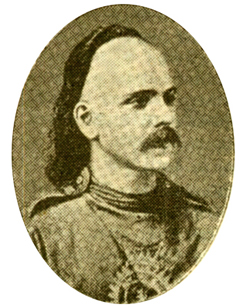
---------------------------------------------------------------------------------------------------
Narayana Muthaiah
Commissioner Narayana Muthiah

Born in 1872 at Palamcottah, Tamil Nadu, of high-caste Hindu parents, Commissioner Narayana Muthiah was early trained by his mother in her own religion, himself becoming a zealous Hindu and, despite education at a missionary high school, developing a deep antagonism to Christianity.
With other young boys he threw stones and caused disturbance when in 1889 the then Staff-Captain Millner, assisted by two or three officers, commenced Salvationist operations in his native town. Eventually challenged by the question of an Indian officer in an open-air meeting, he decided for Christ in the presence of a number of his former co-religionists. He had been greatly affected by the prayer-life of the missionary officers, as he noticed their wrestling for the souls of his people, and by their willingness to give up home and friends and even resort to a local manner of dress and habit in order to win Indians for Christ. Also the remarkable change in the lives of certain young men he had known and who became converted in the Army influenced him deeply.
At first persecuted and finally disinherited by his family, he entered training from Palamcottah in 1899. During cadetship he suffered imprisonment for engaging in open-air work. One of the significant victories he won as a cadet was the overcoming of the age-long prejudice of eating food with, and prepared by, people of lower caste than himself and sometimes of no caste.
Appointed to the city of Tanjore as an assistant to the officers who had been the means of his conversion, he began the series of appointments which he was to hold in Travancore, Telugu, Gujarat, United Provinces, Marathi country and the Punjab, becoming eventually the first Indian officer to rise to the Army’s highest rank of commissioner. He retired in 1938.
Major Herbert Mitchell wrote of him at that time:
‘If you ask me what I consider his outstanding characteristic, I would reply, his religion. In this he worthily represents the distinguishing quality of his race, but his early devotion to the Hindu faith had been replaced by an all-embracing love for God as revealed to him in Jesus Christ. With the Commissioner, prayer is as natural and necessary as breathing. He loves God’s Word and reads it diligently. He delights to tell of his conversion. His religious habits impart a quality, to all the activities of his life.
For many years the Commissioner has borne the burdens of territorial leadership, and he has been an inspiration and blessing to many. Hundreds of Indian officers have looked up to him as a worthy example and non-Indians have found in him a leader and a friend in whom they could trust.
The Commissioner would be the last to claim that his natural endowments included all the highest qualities of leadership, but a combination of natural gifts and divine empowerment have enabled him to discharge his high responsibilities with ability, dignity, and success.’
Mrs Muthiah, whom the Commissioner married as Ensign Nirmala in 1906, was promoted to Glory in 1948.
Harry Andrews
’Harry’ Henry John Andrews [b.1873 d.1919]
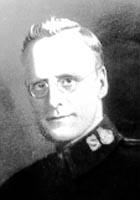
'Harry' Andrews
The History of the Salvation Army vol. 3, Ch.28, p.166, says that Lt Colonel (Dr) Henry J Andrews was brought up in The Salvation Army Nursery at Clapton when the then Miss Emma Booth was the Principal of the Officers’ Training Home. As a youth of fifteen he accompanied her when upon her marriage she went with her husband, Commissioner Booth-Tucker, to India.
Harry became the Salvation Army’s first ‘medical man’ in India, serving almost 30 years there. His work started as an amateur at the age of 17. This was during the1893 cholera outbreak in Travancore. He began in the bathroom of the headquarters in Nagercoil. He received training as a dresser in England in 1896, returning to India to assist Dr. Percy Turner in the establishment of the Catherine Booth Hospital, where the door of the headquarters bathroom is preserved. He was transferred to Anand in Gujarat where he assisted in the establishment of the Emery Hospital. Later he underwent medical training in the USA, returning to India in 1912, serving in Moradabad.
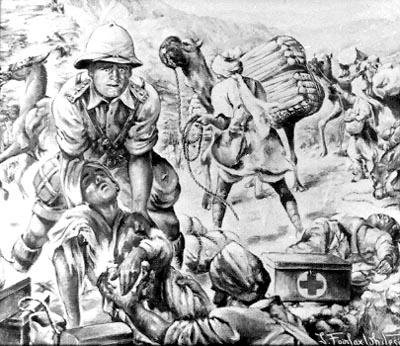
He died heroically, whilst a medical officer attached to the Indian Army on the North-West Frontier in 1919. He was posthumously awarded the Victoria Cross.

Dr. Harry Andrews
See also : further information on his Victoria Cross award
-----------------------------------------------------------------------------------------------------------------------------
Kalidas Vira
Kalidas Vira, was converted in 1898 at one of Booth-Tucker’s meetings held under the shade of a large banyan tree on the outskirts of Vishrampura, near Pedlad. Kalidas was born into a Brahmin family. Brahmins form the priesthood and as such will conduct marriages and offer worship according to Hindu ritual. As a young teenager Kalidas Vira used to accompany his father on his rounds in the neighbouring district, assisting him in his priestly duties and collecting fees from the people.
The day young Kalidas came back from Booth-Tucker’s meeting his appearance had changed his shikka (the Hindu topknot) and janoi (sacred neck thread) were missing. One look at his son was sufficient to make the father furious, for no Brahmin could ever perform his religious duties without these tokens. The family threatened, pleaded and cajoled, but all without effect. At last his father appealed to his sense of duty by saying that if he refused to take part in the rituals their influence and income would be ruined and the family would starve. Regretfully Kalidas refused and begged his parents to accept Jesus as their Saviour and put their trust in Him.
After some months, being impressed by the change in their son, the parents too became Christians. In 1899 Kalidas Vira entered the training garrison at Gamdi and became an officer. During his 42 years of active service in The Salvation Army he won many for Christ through his singing and preaching. Blessed with a good voice and a love for music and poetry, he would compose his own songs. He also started what is known as gayantolis, a group of singers singing Indian Bhajan (songs). These singing brigades have played an important part all over Gujarat. In the early days it was the custom for a group of corps to arrange large annual gatherings known as ‘melas’. Gayantolis from the various corps would take part in the large open-air gatherings during the day and at night gather under a large pandal (tent) and sing their own songs, sometimes well into the night or early morning, drawing large crowds.
Source: By Love Compelled by Solveig Smith
----------------------------------------------------------------------------------------------------------------------------
Kawl Khuma

Kawl Khuma, born in 1890, was brought up with beliefs in spirits surrounding his village - spirits to be appeased by offerings of cocks, pigs and other animals. It was not until he attended school in Aizawl that he heard the Christian gospel. The words of the Mizo pastor spoke directly to the 14-year-old boy and he decided there and then to become a Christian.
After passing the middle school examination in English he was accepted for training as a compounder by the local civil hospital. In his spare time he would go from village to village, together with a Christian friend, preaching the gospel of Christ, winning many converts. One day, sitting among a group of Christian friends, Kawl Khuma suddenly exclaimed, ‘Let us form ourselves into an association of Christians and draw up a special set of rules by which to guide our lives. We could all live together in a separate community, and to give a better witness I think we should wear uniform.’ After discussing the possibility of such a venture, they decided their uniform should consist of a kaki coat with a piece of red cloth sewn on the upper edge of the breast pocket.
He was told that his association resembled The Salvation Army. Having studied English he had no difficulty in explaining to his friends, and their reaction was – how can we contact The Salvation Army? Someone told them of Booth-Tucker being the leader and that the headquarters was in Simla in north India. Kawl Khuma wrote to him. When the reply came with an invitation to come to Simla, Kawl Khuma and his friend Pu Chalchhuna, with whom he had formed the group of uniformed Christians, decided to make the journey together.
Chalchhuna’s health, unfortunately, was giving cause for anxiety. Admitted to hospital the doctor diagnosed ‘double pneumonia’. On the seventh day Chalchhuna passed away. He was given an Army funeral and Salvationists stood by Kawl Khuma in the loss of his dearest friend.
A few days later Kawl Khuma was called to Commissioner Booth-Tucker’s office. ‘Are you willing to travel to Bombay and undergo training in The Salvation Army training home, and then give your life in service for God in the Army?’ asked the Commissioner. Seeing the Army at close quarters had strengthened his determination to become a Salvation Army officer. Once again he set out, this time alone, on the two-day journey to Bombay.
Kawl Khuma had only one idea, and that was to open up the work of The Salvation Army among his own people. Army leaders were not sure that the time was ripe. Two missions were already operating in the area and The Salvation Army did not want to cause dissension. On the day of commissioning when the cadets, true to Army traditions, accepted the appointment given wherever it may be, Kawl Khuma was appointed to the criminal tribes settlement in Gorakhpur. Convinced that God wanted him to preach to his own people, he wrote after a short time and Commissioner Booth-Tucker allowed him to return to his home.
Arriving in Aizawl he was greeted with affection by family and friends, all eager to hear of his adventures in the world beyond the hills, and especially about the international Chhandamna Sipai. Kawl Khuma hadn’t been home long before he received a letter from Colonel Sukh Singh (Blowers), Chief Secretary for India and Ceylon, which stated:
As we are unable at present to commence Salvation Army work officially in your district, we advise you to return to your former occupation. You will still retain your rank of Lieutenant, but we will be unable to pay you any remuneration. However, we shall constantly pray for you that the Lord may use you mightily in His service.
The reason for this letter was a refusal from the government to permit more than the two existing missions to operate in Mizoram. Kawl Khuma believed that God had directed him to The Salvation Army and it was within this framework that he wanted to work. Many of his friends encouraged him. Together they constructed two large communal houses of bamboo and grass in Sawleng village. In order to support themselves they brought two pack animals and set up a transport business carrying rice and other products for sale to Aizawl. Kawl Khuma was made responsible for the business.
However he was happiest when, with a Salvation Army flag held high on a bamboo pole, he marched from village to village conducting meetings in Salvation Army fashion. He even got a drum, which delighted the music-loving Mizo people. Marching to its beat behind the flag they visited Aizawl. A revival spread throughout the hills and thousands turned in faith to Christ.
Kawl Khuma realised that instruction in the new faith was essential to make strong Christians. He wanted every convert to have a copy of the Handbook of Doctrine and Orders and Regulations for Soldiers in their own language. The Salvationists gathered in conference. It was decided that another should take over the transport business and leave Kawl Khuma free to translate the books. He also translated Salvation Army songs into Mizo.
When in April 1921 Mizo Salvationists heard that a training home was established in Calcutta, they applied for some of their young men to be admitted. Six candidates, under Kawl Khuma’s leadership were accepted. On their return to Mizoram they established six corps from which sprang 31 outposts in neighbouring villages.
A year later Kawl Khuma was called to Calcutta. Complaints had been sent in to the government that Salvationists were causing disturbance by interfering with the already established churches and headquarters was advised to withdraw its forces.
Some months later, in the latter part of 1924, the Territorial Commander of the Eastern India Territory, accompanied by Kawl Khuma and two missionary officers, made a week-long journey from Calcutta to Aizawl to inquire into the allegations. Interviews were arranged with leaders from the Welsh Presbyterian Church. The complaints were evidently unfounded and the authorities lifted some of the restrictions and officers were permitted to resume their ranks and uniform wearing. Headquarters advised the officers to take responsibility for the work in their home villages. A salt-selling business was organised by Salvationists to support the work.
April 1925 Kawl Khuma was transferred from his appointment in Bengal to return to Mizoram to strengthen and encourage the faithful Salvationists. It was not until the early part of 1928, however, that government permitted The Salvation Army to operate officially in Mizoram.
In 1945 Mizoram, with 30 corps, became a division and Brigadier Kawl Khuma designated the divisional commander.
In 1959, leaving Senior-Major Coxhead to take charge of the 39 corps which had so far been established, Brigadier Kawl Khuma set out to pioneer the work in Cachar in Assam. The district was in a state of political upheaval following the partitioning of nearby East Pakistan from India. Thousands of Hindu refugees had flooded the town of Silchar, the capital. Communal strife between Hindus and Muslims expressed itself in arson. It was not an easy task for the 60-year old officer and his wife to face this challenge; neither did a different language make it any easier. Kawl Khuma, however, was undaunted. When conditions settled he set out to contact Mizos who had moved to the district. He also commenced work in Manipur. When in January 1956 Kawl Khuma returned to Aizawl to enter retirement he left this opening with a soldiers’ roll of 400 names.
General Frederick Coutts admitted Lieut. Colonel Kawl Khuma (R) to the Order of the Founder in 1966.
Source: By Love Compelled – by Solveig Smith
----------------------------------------------------------------------------------------------------------------------------------------
Walter Kiel
Walter Keil (Lt. Col. Yesu Patham)
Among the first converts under Major Tucker’s ministry in Bombay in 1882 was Walter Keil, a young telegraphist, a Burgher from Ceylon of mixed Dutch and Singhalese ancestry. With a crowd of miscreant friends he had gone, out of curiosity, to see The Salvation Army. At the close of the meeting Major Tucker had put his hand on the shoulder of the young Walter and asked, ‘Where will you spend eternity?’ It made the young man think, he realized the need for a purpose in life and decided to follow Jesus and serve Him in the Army.
Within a few weeks, as Lieutenant Yesu Patham, Walter Keil was actively engaged in full-time service for God and the Army. He served faithfully for 41 years as an officer, mostly in south India and Ceylon, and received from the hand of General Bramwell Booth the Order of the Founder, a worthy recognition of a long life of self-sacrifice and devotion.
--------------------------------------------------------------------------------------------------------------------------------------
|
|
Major & Mrs Aziz
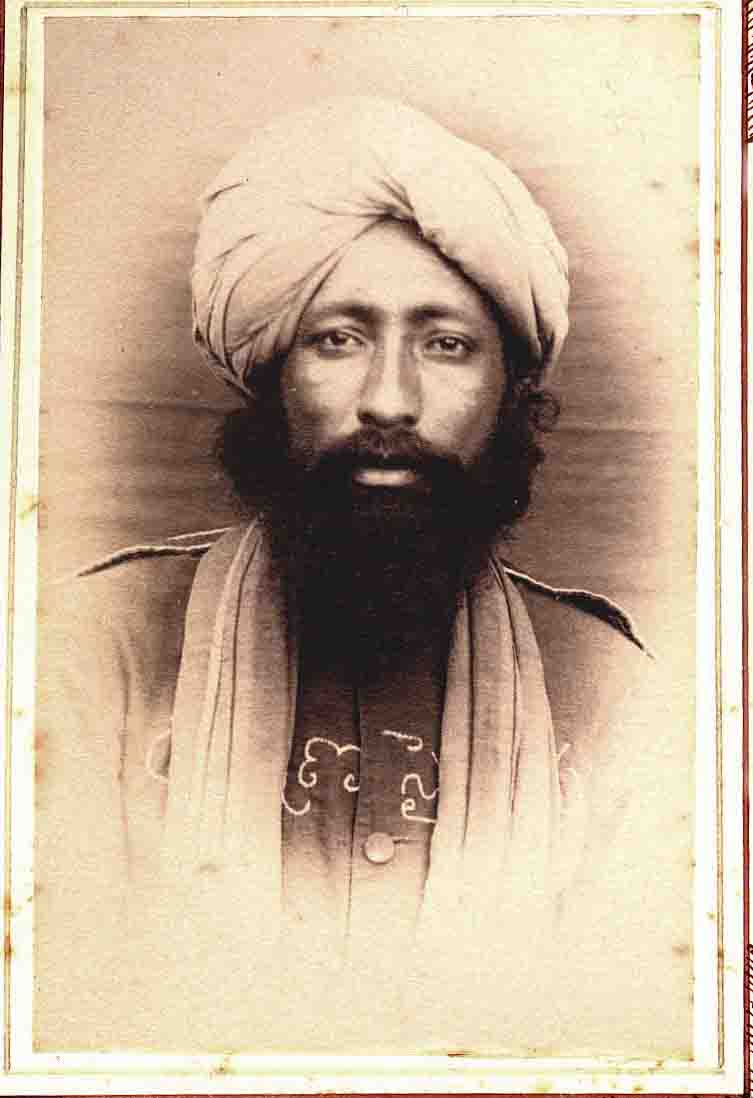
Salvation Army work was commenced at Vijayawada in Andhra Pradesh in 1895 by Staff Captain Abdul Aziz, a person of Muslim background with his friend Mahanada. Captain Abdul was spiritually renewed while attending the revival meeting of Captain Henry Bullard in 1884 at Bangalore, and dedicated his life as a Salvation Army officer.

---------------------------------------------------------------------------------------------------------------------------------------------
Staff Captain Sundram

Mrs Staff Captain Sundram

Staff Captain Deva Sundram
---------------------------------------------------------------------------------------------------------------------------
Staff Captain Sona Bai

Staff Captain Sona Bai (Boscombe)
--------------------------------------------------------------------------------------------------------------------
Staff Captain Apperson
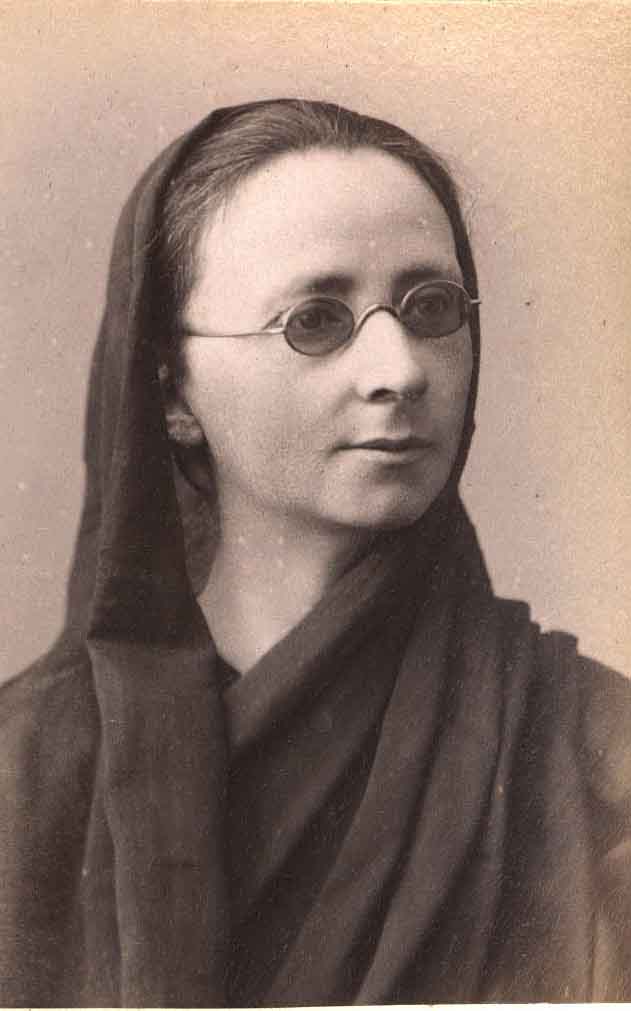
Staff Captain Kawna (Apperson)





